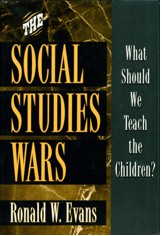 This long awaited biography of Harold Rugg is a dramatic, compelling story with profound implications for today’s educators. Harold Rugg, one of the leading progressive educators of the 20th century, developed an innovative social studies program and textbook series that was censured by conservative critics during the 1940s. Get the full story behind Rugg, the man and the educator, and the critics who attacked him.
This long awaited biography of Harold Rugg is a dramatic, compelling story with profound implications for today’s educators. Harold Rugg, one of the leading progressive educators of the 20th century, developed an innovative social studies program and textbook series that was censured by conservative critics during the 1940s. Get the full story behind Rugg, the man and the educator, and the critics who attacked him.
Harold O. Rugg was professor at Teachers College, Columbia University, and a key leader among the social frontier group that emerged in the 1930s to argue that schools should play a stronger role in helping to reconstruct society. He was author of a best selling social studies textbook series which came under attack from patriotic and business groups in the early years of World War II. The story of his rise and fall encapsulates a pivotal episode in the history of American education and reveals a great deal about the direction of schooling in American life, the many roads not taken, and possibilities for the future. This in-depth examination of Rugg’s life and career provides historical perspective on the recurring struggles over education. It will be of interest to every citizen concerned about the future of our democracy.
***Recipient of the 2008 Exemplary Research Award from the National Council for the Social Studies***
“This Happened in America is an immensely engaging, thoroughly researched, and well-written intellectual biography of one of America’s leading progressive educators. Evans’ narrative of Rugg’s committed struggle to reconstruct the social studies curriculum into an interdisciplinary focus on major controversial issues contributes not only to the study of American education but captures the great ideological conflicts between conservatives and progressives in American democracy.
Evans’ book is a highly instructive examination of how schools contribute to forming future citizens’ perspectives of their social and political reality. It recounts how Rugg’s efforts to redefine the social studies curriculum pitted him in a heightened and dramatic conflict in the late 1930s and early 1940s against cultural and political conservatives. This lively and comprehensive biography of Rugg provides a deep, turbulent, and inspiring account that informs us today about the profound connections between the school and society. Rugg’s concept of the artist-teacher remains as an ideal that contemporary educators need to reexamine.” ∼ Gerald L. Gutek, Professor Emeritus of Education, Loyola University, Chicago
“Ron Evans shows why Harold Rugg’s curriculum work resides at the center of some of the most roiling educational debates of the 20th century. At the same time, Evans’ intensive research and fine-grained analysis illuminates why Rugg’s ideas remain pertinent today.”
∼ David T. Hansen, Professor and Director, Program in Philosophy and Education,
Teachers College, Columbia University
“Ron Evans brings one of the giants of American education fully to life in this thoroughly researched and vividly rendered biography. Harold Rugg was a driving force in the progressive schools movement and the leading figure in the development of social studies as an area to challenge the deadening standardization that characterized the schools of his day. Rugg knew that education could never be neutral, and he fought for a vision of schools as a central force in the reconstruction of society along lines of freedom, participatory democracy, creativity, and justice. Evans captures Rugg in all his three-dimensional and contradictory splendor.”
∼ William Ayers, Distinguished Professor of Education, University of Illinois, Chicago.
 By exploring the tensions, impacts, and origins of major controversies relating to schooling and curricula since the early twentieth century, this insightful text illustrates how fear has played a key role in steering the development of progressive education in the United States.
By exploring the tensions, impacts, and origins of major controversies relating to schooling and curricula since the early twentieth century, this insightful text illustrates how fear has played a key role in steering the development of progressive education in the United States.

